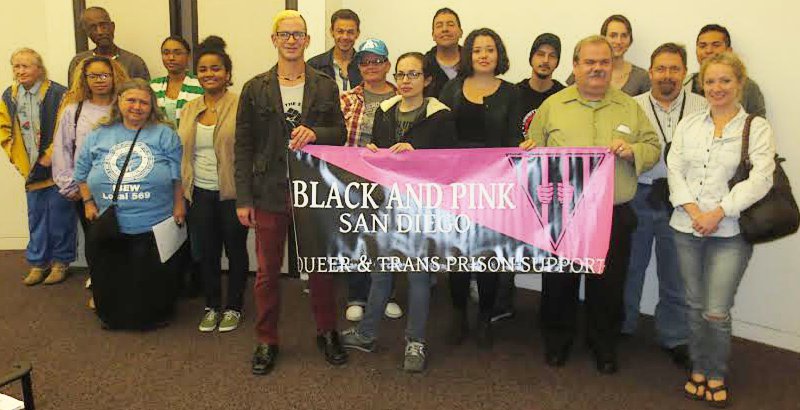

WW photo: Gloria Verdieu
San Diego, Calif. — A film showing the blatant discrimination that transgender people endure in the prison system was shown here on Jan. 12.
The screening of “Cruel & Unusual: Transgender Women in Prison,” followed by a discussion about the prison-industrial complex, was hosted by Black & Pink San Diego. The moving and caring documentary describes in detail the experiences of five transgender women incarcerated in prisons in five different states.
The U.S. prison system decides where to place inmates based on their genitals, not their gender identity. These women were initially placed in the general population with men. They went through inhumane and humiliating treatment, including rape, violence and solitary confinement. Medical treatment they had been receiving prior to incarceration was denied by prison authorities, who refused to recognize gender identity disorder as a legitimate medical condition.
Many people who attended the screening had gone to a rally the previous day to defend the rights of transgender students. The rally urged passage of the School Success and Opportunity Act (AB 1266), a new California bill that guarantees transgender students safe access to facilities and activities in public schools. The rally was called by Canvas for a Cause.
After the film, Black & Pink organizer James Messer led a discussion, starting with an update on some of the terminology used, since the film was released in 2006. The discussion included statistics noted in the film, such as 30 percent of transgender people are incarcerated and many are held in solitary confinement.
Transgender prisoners, like so many of the more than 2 million people held in U.S. prisons, are there because of economics. Many are homeless, jobless, isolated from family and lack the finances to get adequate legal representation. These women don’t deny that they should pay for the crimes they committed, but listening to the stories many conclude that their crimes are crimes of survival. The discussion also led to possible solutions, with emphasis on raising people’s awareness about the U.S. criminal injustice system.
Messer gave an update on the case of CeCe McDonald, who is scheduled to be released in January. Rallies in cities across the U.S., including San Diego, helped force the justice system to reevaluate her case, resulting in her release.
Black & Pink has been in existence for nine years, with chapters forming in cities across the U.S. The recently formed San Diego chapter has been meeting for three months. Black & Pink is a strong advocate for the abolition of both the prison-industrial complex and the death penalty. Its website says it is “an open family of LGBTQ prisoners and ‘free world’ allies who support each other.”
One of the many B&P projects is an online pen-pal program where LGBTQ prisoners can list their names, addresses and a 25-word ad (nonsexual) describing what they want from a pen pal.
The San Diego People’s Power Assembly-United for Racial Justice and the Committee Against Police Brutality sponsored this event at the Malcolm X Library as part of the ongoing struggle for unity in our community. The purpose of these assemblies is to educate our communities about local grassroots organizations and what they are doing.
Verdieu gave a welcoming and a background talk on the PPA.
As part of Workers World newspaper’s coverage marking the 50th anniversary of the liberation of…
From the PFLP Central Media Office The following statement from the Popular Front for the…
Newark, New Jersey Over 250 people, representing over 250 New Jersey endorsing community groups, attended…
Special to Workers World The following is a press release issued on April 24, 2025,…
dear Larry Krasner, we heard you sued Elon Musk over his corrupt million election giveaways…
Unions join forces against harassment and deportation of members When 200 immigrant workers – from…